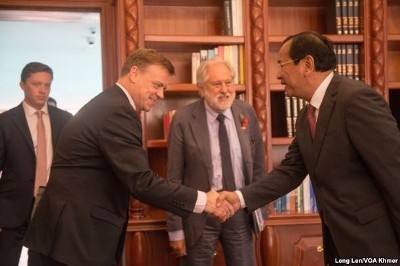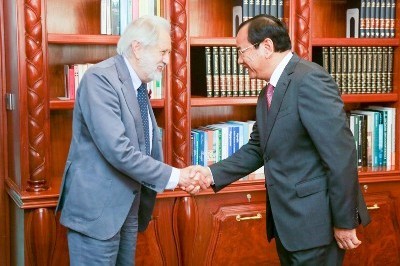Head of APSA Awards Jury, Lord Puttnam discusses the significance of family and quality of male performances at the 2016 APSA Film Awards
Turkish social drama “Cold of Kalandar” was the biggest winner at the 10th edition of the Asia Pacific Screen Awards.
At a ceremony in Brisbane, Australia on Thursday “Kalandar” claimed the best feature film prize and also the achievement in cinematography award. It is the second time that a Turkish film has taken APSA’s top prize, after Greek-Turkish co-production “Beyond the Hill” won in 2012.
The film, which was selected as Turkey’s contender for the foreign-language Oscar race, premiered at the Tokyo festival 13 months ago and won the festival’s best film and best directing for prize for Mustafa Kara.
Its selection as Turkey’s Oscar contender was significant. The film delivers hard-hitting social criticism and an image of impoverishment and desperation that is far from the image of an economic powerhouse that conservative President Recep Tayyip Erdogan is currently trying to present.
Social criticism was a recurring theme throughout the APSA nominations and tonight’s prizes. The best directing prize went to China’s Feng Xiaogang for his recently released “I Am Not Madame Bovary,” which is a bitter satire on China’s judiciary system. The APSA UNESCO Diversity prize went to “The Dark Wind,” a drama about the persecution of the Yazidi ethnoreligious group trying to live under the shadow of ISIS.
“’The Dark Wind’ is a wonderful film, but very sad. Coming to these awards, I had not realized the subject matter of the Yazidis, and we wanted to highlight this to the world, and bring more attention to these people,” said veteran producer and APSA jury member Nansun Shi.
Jury head, Lord David Puttnam said: “There were two significant things I came away with: number one was how often the issue of family occurred, the importance of family and the role of family, is an underlying theme that popped up time and time again. The other that I found really encouraging was the quite extraordinary quality of the male performances. I have never seen that number of absolutely outstanding male performances — ever. Anywhere.”
Puttnam said that the jury could have awarded six male acting prizes. In the end it rewarded two Indian performers. Manoj Bajpayee won the APSA prize for his performance in “Aligarh,” as university professor Shrinivas Ramchandra Siras who, in 2010, was fired from his position for his sexual orientation. A special mention went to Indian actor Nawazuddin Siddiqui for his performance in Anurag Kashyap’s “Psycho Raman” (aka “Raman Raghav 2.0”.) An unusually restrained Kashyap accepted the prize on Siddiqui’s behalf.
The large number of folk in town for APSA’s 10th anniversary, a meeting of the film schools organization CILECT and the Asian Animation Summit meant that a larger venue than in previous years was necessary. Some 960 people were seated at more than 70 tables.
The awards ceremony was held in a cathedral-like auditorium inside Brisbane’s Convention Center, complete with choral singing, projection mapping and a high degree of formality. Job titles, honorary titles, medals and country names were all read out in full. The original occupants of the land were honored with stirring didgeridoo and vocal performance and some minor pyrotechnics.
“Think what life would be like without cinema,” said David Puttnam. “It would be little else but an economic competition.”





 The United Kingdom’s trade envoy to Cambodia, Lord David Puttnam, has reassured Phnom Penh that the UK’s likely exit from the European Union will not damage trade relations between the two countries.
The United Kingdom’s trade envoy to Cambodia, Lord David Puttnam, has reassured Phnom Penh that the UK’s likely exit from the European Union will not damage trade relations between the two countries.

